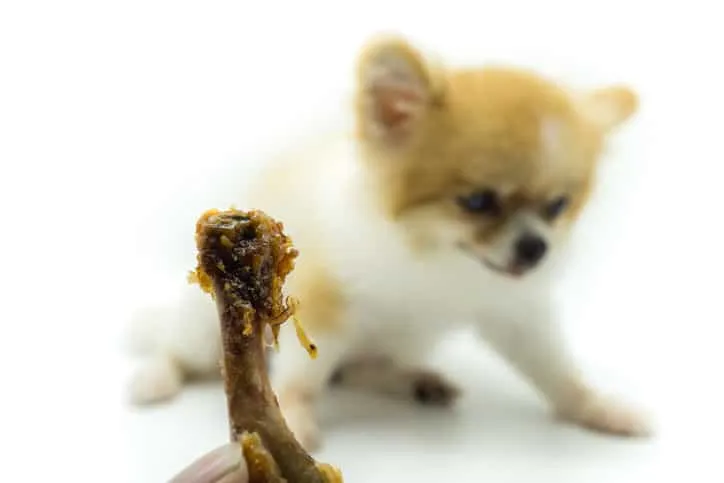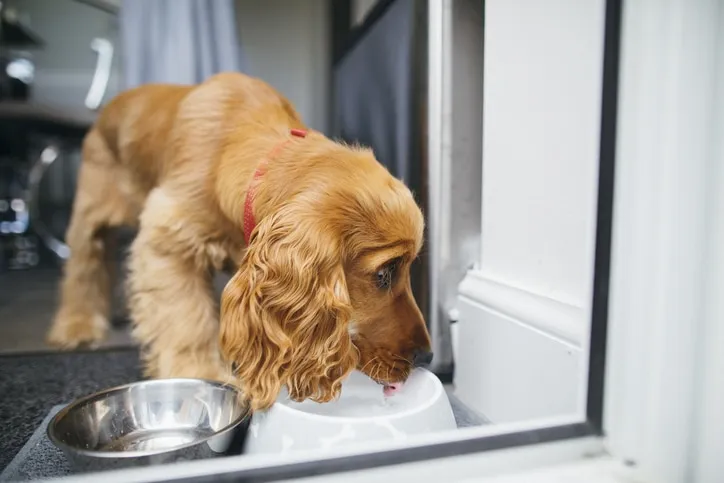Discovering that your dog ate a chicken bone can be alarming, but staying calm is key to ensuring their safety. Chicken bones are brittle and can splinter, potentially causing choking, internal injuries, or blockages in the digestive tract. Whether it’s a cooked bone from dinner or a scavenged scrap, knowing the right steps can make all the difference for your furry friend’s health. In this guide, we’ll cover essential dos and don’ts based on veterinary expertise to help you respond effectively.
For more insights into safe foods, check our comprehensive list of what dogs can t have.
Command Your Dog to Drop It Immediately
If you catch your dog in the act before they swallow the chicken bone, issue a firm “drop it” or “leave it” command. Well-trained dogs often respond quickly, releasing the bone without further issue. Once dropped, inspect their mouth closely for any fragments and dispose of the bone securely. Supervise them afterward to prevent sneaky attempts to retrieve it. Training reinforces these vital safety habits, potentially averting a crisis.
This approach works best with positive reinforcement training methods recommended by organizations like the American Veterinary Medical Association (AVMA).
 dog eats a chicken bone in westminster, co
dog eats a chicken bone in westminster, co
Avoid Inducing Vomiting at Home
Never attempt to induce vomiting if your dog ate a chicken bone, as the sharp splinters could lodge in the throat or esophagus during the process, worsening injuries. Instead, contact your veterinarian right away for personalized advice. They may recommend monitoring or professional intervention based on your dog’s size, the bone’s condition, and symptoms.
Home remedies like hydrogen peroxide are risky without guidance, as noted in veterinary guidelines from sources such as the ASPCA Animal Poison Control Center.
Safely Remove the Bone from Their Mouth
If the bone is still in your dog’s mouth, gently pry their jaws open by pressing lightly under the jaw to release it. Use calm movements to avoid startling them, which could lead to panicked swallowing or biting. Remove any visible shards from gums or teeth carefully with clean fingers or tweezers if accessible. Rough handling can cause fractures or escalate the danger.
Smaller dogs face higher risks due to narrower airways, so act swiftly but delicately.
Skip the Cotton Ball Myth
Feeding cotton balls soaked in oil or milk is a dangerous old wives’ tale—avoid it entirely. These can clump in the stomach, leading to blockages or surgical emergencies. Stick to evidence-based actions advised by vets, prioritizing professional care over unproven hacks.
Check for Choking Signs Promptly
Observe your dog closely for choking indicators like excessive pawing at the mouth, gagging, blue gums, or labored breathing. Chicken bones splinter easily during chewing, creating hazardous fragments, while whole swallows might pass through larger breeds’ systems. However, small dogs are prone to obstructions. Perform basic pet first aid if trained, such as the canine Heimlich maneuver, but seek emergency help immediately.
To explore broader food safety, see our what not to feed your dog chart.
 dog eats a chicken bone
dog eats a chicken bone
Contact Your Veterinarian Without Delay
Phone your vet or an emergency clinic right away, especially if distress signs appear—coughing, retching, or lethargy. Provide details like your dog’s breed, size, bone quantity, and timing. They might suggest X-rays to track fragments, as supported by studies on gastrointestinal foreign bodies (e.g., NCBI research on bone-related surgeries). Even if your dog seems fine, proactive reporting allows monitoring for delayed issues like perforations.
Larger dogs may digest fragments better, but no assumptions—professional assessment is crucial.
Offer Bread and Water for Protection
If no choking occurs and vet approval is given, provide small pieces of plain white bread and fresh water. The bread cushions sharp edges through the esophagus and stomach, while hydration aids passage. Bone broth can stimulate digestive juices to soften remnants naturally. Limit portions to avoid overload.
This supportive measure aligns with vet-recommended protocols for minor ingestions.
For related tips, review what can dogs eat and what can they not eat.
Monitor Closely for 24-48 Hours
Post-incident vigilance is essential, even if symptoms are absent initially. Watch for red flags including lethargy, abdominal bloating, appetite loss, vomiting (especially with blood), diarrhea, straining to defecate, whining, or pain on palpation. Track stool for bone pieces or blood. Baseline knowledge of your dog’s normal behavior helps spot subtleties.
If any arise, rush to the vet—complications like peritonitis from punctures require urgent surgery. Experience from pet owners and vets underscores that 24-72 hour windows are critical for interventions.
Additional resources like what human food can bulldogs eat can prevent future mishaps.
Prevention Tips for Long-Term Safety
Secure trash bins, elevate counters, and train “leave it” consistently to minimize risks. Opt for vet-approved chews over real bones. Regular check-ups ensure overall digestive health.
Conclusion
Handling a situation where your dog ate a chicken bone demands quick thinking, avoiding myths, and leaning on veterinary expertise. By commanding drop, monitoring diligently, and seeking professional help promptly, you boost recovery odds significantly. Prevention through secure environments and education safeguards your pet’s well-being. Always consult your vet for tailored advice, and explore more on safe feeding practices to keep your dog thriving.
References
- American Society for the Prevention of Cruelty to Animals (ASPCA): Poison Control Guidelines.
- National Center for Biotechnology Information (NCBI): PMC8965252 on gastrointestinal foreign bodies.
- American Veterinary Medical Association (AVMA): Pet Nutrition and Safety Recommendations.
